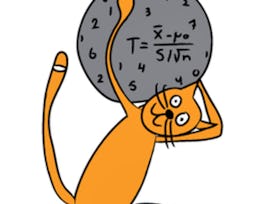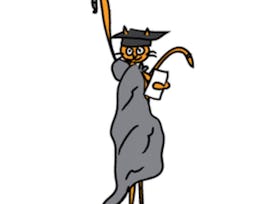Discover the principles of solid scientific methods in the behavioral and social sciences. Join us and learn to separate sloppy science from solid research!


Quantitative Methods
This course is part of Methods and Statistics in Social Sciences Specialization
Taught in English
Some content may not be translated

Instructor: Annemarie Zand Scholten
137,538 already enrolled
Included with 
Course
(2,229 reviews)
98%
Details to know

Add to your LinkedIn profile
10 quizzes
Course
(2,229 reviews)
98%
See how employees at top companies are mastering in-demand skills

Build your subject-matter expertise
- Learn new concepts from industry experts
- Gain a foundational understanding of a subject or tool
- Develop job-relevant skills with hands-on projects
- Earn a shareable career certificate


Earn a career certificate
Add this credential to your LinkedIn profile, resume, or CV
Share it on social media and in your performance review

There are 9 modules in this course
In this first module we'll consider the basic principles of the scientific method, its history and its philosophies. But before we start talking methods, I'll give you a broad sense of what the course is about and how it's organized. Are you new to Coursera or still deciding whether this is the course for you? Then make sure to check out the 'Introduction' and 'What to expect' section below, so you'll have the essential information you need to decide and to do well in this course! If you have any questions about the course format, deadlines or grading, you'll probably find the answers here. Are you a Coursera veteran and anxious to get started? Then you might want to skip ahead to the first course topic: the Origins of the Scientific Method. You can always check the general information later. Veterans and newbies alike: Don't forget to introduce yourself in the 'meet and greet' forum!
What's included
2 videos9 readings
Science is all about gaining knowledge, coming up with the best possible explanations of the world around us. So how do we decide which explanation is the best one? How do we make sure our explanations are accurate? How do we determine we actually know something? In science we try to resolve these questions by using a set of principles and procedures called the scientific method. You need to know its historical and philosophical 'origin story' to really understand the scientific method and to fully appreciate how hard it is to apply the scientific method in the social and behavioral sciences!
What's included
14 videos9 readings1 quiz1 peer review
In the first module we discussed how the scientific method developed, general philosophical approaches and the types of knowledge science aims to find. In this second module we'll make these abstract principles and concepts a little more concrete by discussing the empirical cycle and causality in more detail. We’ll see how, and in what order these concepts are implemented when we conduct a research study. We'll also consider the main criteria for evaluating the methodological quality of a research study: Validity and reliability. The focus will be on internal validity and how internal validity can be threatened.
What's included
13 videos8 readings2 quizzes1 peer review
In the previous module we discussed the empirical cycle, causality and the criteria for methodological quality, focusing on threats to internal validity. In this module we'll consider the most frequently used research designs and we'll see how they address threats to internal validity. We'll look at experimental, quasi-experimental and correlational designs, as well as some other designs you should be familiar with. To understand and appreciate these designs we will discuss some general concepts such as randomization and matching in a little more detail.
What's included
15 videos8 readings1 quiz1 peer review
Choosing a design is only the first step in the deduction phase (remember the empirical cycle?). The second step is deciding on specific ways to measure the variables of interest and disinterest. This step is extremely important, because even if we are able to perform a true double-blind experiment, if our measurement and manipulation method are of poor quality, then internal validity will still be compromised! In this module we'll look at what measurement is exactly and what the criteria for evaluating measurement are. We will also look more in-depth at self-report measures, including survey, questionnaires and tests. These methods are among the most frequently used measurement instruments in the social and behavioral sciences.
What's included
14 videos6 readings1 quiz1 peer review
In the previous two modules we discussed research designs and methods to measure and manipulate our variables of interest and disinterest. Before a researcher can move on to the testing phase and can actually collect data, there is just one more procedure that needs to be decided on: Sampling. Researchers need to determine who potential participants are and how they will be selected and recruited.
What's included
13 videos7 readings1 quiz1 peer review
In this last content module we will focus on the part of the research process that follows data collection. The specifics of storing data and using statistics form a course topic in their own right (see the specialization courses on Basic and Inferential Statistics). For now we will focus on more general issues to do with data, interpretation and dissemination of results that relate to ethics and integrity. Some of the concepts that we discuss here will be familiar if you watched the interviews of the past modules. It might be interesting to (re-)watch these if you have the time!
What's included
13 videos6 readings1 quiz2 peer reviews
In this module there's no new material to study. The only requirement in this module is that you finish up the final peer review assignment. We also advise you to take some extra time to review the material from the previous modules and to practice for the final exam. We've provided two practice exams that you can take as many times as you like. In the first one, feedback for each answer will be provided right after taking the test. We've also created some screencast videos that explain the right answers to the second practice exam in more detail.
What's included
3 videos1 reading2 quizzes1 peer review
This is the final module, where you can apply everything you've learned until now in the final exam. The final exam is structured exactly like the practice exam, so you know what to expect. Please note that you can only take the final exam once a month, so make sure you are fully prepared to take the test. Please follow the honor code and do not communicate or confer with others taking this exam. Good luck! Once you've taken the exam why not check out the bonus material - a series of presentations on research integrity in the social sciences, presented at a special symposium at the University of Amsterdam in 2014.
What's included
1 reading1 quiz
Instructor

Offered by
Recommended if you're interested in Research Methods

University of Amsterdam

University of Amsterdam

University of Amsterdam

University of Amsterdam
Why people choose Coursera for their career




Learner reviews
Showing 3 of 2229
2,229 reviews
- 5 stars
81.14%
- 4 stars
14.76%
- 3 stars
2.37%
- 2 stars
0.71%
- 1 star
0.98%

Open new doors with Coursera Plus
Unlimited access to 7,000+ world-class courses, hands-on projects, and job-ready certificate programs - all included in your subscription
Advance your career with an online degree
Earn a degree from world-class universities - 100% online
Join over 3,400 global companies that choose Coursera for Business
Upskill your employees to excel in the digital economy
Frequently asked questions
Access to lectures and assignments depends on your type of enrollment. If you take a course in audit mode, you will be able to see most course materials for free. To access graded assignments and to earn a Certificate, you will need to purchase the Certificate experience, during or after your audit. If you don't see the audit option:
The course may not offer an audit option. You can try a Free Trial instead, or apply for Financial Aid.
The course may offer 'Full Course, No Certificate' instead. This option lets you see all course materials, submit required assessments, and get a final grade. This also means that you will not be able to purchase a Certificate experience.
When you enroll in the course, you get access to all of the courses in the Specialization, and you earn a certificate when you complete the work. Your electronic Certificate will be added to your Accomplishments page - from there, you can print your Certificate or add it to your LinkedIn profile. If you only want to read and view the course content, you can audit the course for free.
If you subscribed, you get a 7-day free trial during which you can cancel at no penalty. After that, we don’t give refunds, but you can cancel your subscription at any time. See our full refund policy.

